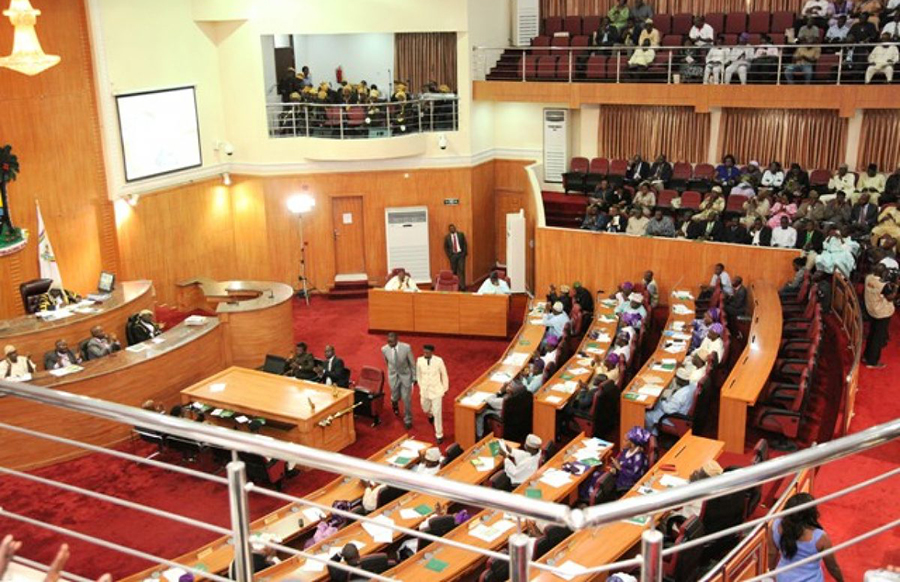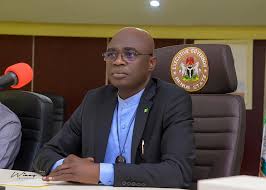POLITICS
Lagos Assembly passed 300 Bills, 2000 Resolutions in 25 Years- Speaker

The Lagos State House of Assembly has passed 300 bills and 2,000 resolutions since the return of democratic dispensation in 1999.
The Speaker, Mr Mudashiru Obasa, disclosed this at a programme to commemorate 25 years of unbroken democratic governance on Wednesday in Lagos.
Reports says that the programme was organised by the Lagos State House of Assembly and had the theme: Building a Brighter Future: A journey of Hope and Aspirations.
Obasa said some of the bills and resolutions were historic.
The Speaker said the bills were those that eventually became laws ,which had impacted residents greatly as well as people outside of the state.
“Particularly worthy of mention are the Financial Autonomy law, Neighbourhood Safety Agency law, Regulation Approval law, and the Local Government Administration law, which created 37 Local Council Development Areas (LCDAS).
“This is in addition to the existing 20 local government reas in the state for the purpose of bringing government closer to the teeming Lagosians.
“The law also creates a four-year tenure for elected officials of the local government councils, making Lagos the first state in Nigeria to do so.
“Also, there are the Traffic Sector Reform law which created the Bus Rapid Transportation (BRT) system and the Lagos State Transport Management Authority (LASTMA) law.
“Our BRT law became a prototype design for many other states in Nigeria and some West African countries like Ghana and the Gambia.
“As a matter of fact, most of our laws, including our House Rules, have become models for other State Houses of Assembly in Nigeria,” he said.
The Speaker added that in the area of education, the Assembly had enacted the Lagos State University of Science and Technology law, which converted the old Lagos State Polytechnic to a full university.
He noted that one of the beauties of law was that it would eliminate the discrimination against polytechnic graduates in the labour market .
Obasa explained that the Lagos State College of Education was upgraded to Lagos State University of Education through an enabling law, thereby increasing the number of universities established by the state to three.
The Speaker said in a bid to proffer solutions to the security challenges facing tbe country, the Assembly pioneered the agitation for the creation of state police .
He said due to constitutional constraints, an abridged form of security outfits called the Neighbourhood Safety Corps Agency was created to assist the police in maintaining law and order and enhance community policing in the state.
Obasa recalled that the very first session of the Assembly was headed by Mr Oladosu Osinowo (Ikorodu Urban II constituency) between October, 1979 and September, 1983.
He said Osinowo laid the foundation for the vibrancy of the House as well as the brilliant leadership for which the Assembly was revered.
The Speaker noted that at the time Osinowo was Speaker, Alhaji Lateef Jakande was the governor of the state and that his administration built the Assembly complex.
He said the second Lagos Legislative Assembly was headed by Mr Oladimeji Longe (itire-Ikate constituency) between October, 1983 and December, 1983 while Mr Shakirudeen Kinyomi (Ojo I constituency) was the Speaker in the third Legislative Assembly .
The speaker said since Fourth Legislative Assembly, led by Dr Olorunnibe Mamora (Kosofe I constituency) ,was inaugurated by the then governor of the state and now President Bola Tinubu on the June 2, 1999.
“The Assembly has enjoyed relative stability in its leadership with only four Presiding Officers in 25 years of uninterrupted democracy in Nigeria.
“This has, in no doubt, enhanced innovation, competence and capacity. Mamora led the House between June 1999 to June 2003, followed by Mr Jokotola Pelumi (Epe II), who led between June 2003 and December 2005.
“Then, Mr Adeyemi Ikuforiji (Epe I) took the mantle and led between December 2005 and June 2015.
“In addition, I am the current and longest serving legislator and Speaker in Nigeria, I was first elected Speaker in June 2015, I was re-elected in 2019 and again returned in 2023,” he said.
The Speaker said the Assembly avowed commitment to excellence in all its ramifications had made the state the bride of all since 1999.
Obasa said the Assembly had lived by its creed, reflecting positively on the constituents who had put their hopes on it as an alternative dispute resolution mechanism for prompt, fair and effective dispensation of justice. (NAN)
NEWS
Tinubu Arrives Anambra on Maiden One-Day Working Visit

President Bola Tinubu arrived in Anambra State on Thursday for a one-day working visit to inaugurate key development projects executed by the state government.
The President touched down at 12:15p.m. at the Presidential Wing of the Chinua Achebe International Airport, Umueri.
His arrival was met with a warm reception, including a traditional dance performance by a cultural troupe.
Welcoming the President were several dignitaries, including Anambra State Governor, Prof Chukwuma Soludo, his Deputy, Onyekachukwu Ibezim; members of the House of Assembly; top dignitaries from the state, among others.
Tinubu received some gun salutes from personnel of the Nigerian Army, Navy and Air Force.
President Tinubu would inaugurate the Solution FunCity, Anambra Country Club, New Government House, New Government Lodge, New Presidential Lodge and Emeka Anyaoku Center Unizik, Awka.
He will also inaugurate the Iconic Light of the Nation Tower located at the new state Government House, symbolising the state’s slogan.
The tower was constructed by Dutum Construction Ltd, led by its Managing Director Mr Temitope Runsewe.(NAN)
NEWS
Benue Governor Rejects Reps Committee Invitation

Alia will not honour the House of Representatives Committee invitation scheduled for Thursday, May 8.
His Chief Press Secretary, Mr Tersoo Kula, confirmed this to journalists on Wednesday in Makurdi.
The News Agency of Nigeria (NAN) reports that the House had summoned the Governors of Benue and Zamfara, alongside their Assembly leadership.
Kula stated that the invitation is unconstitutional and the governor will not comply with it.
He explained that Alia has filed a case at the Supreme Court challenging the lawmakers’ invitation.
“Yesterday, the Benue Assembly passed a resolution rejecting the Reps Committee invitation.
“They believe the invitation is based on ignorance and have decided not to attend.
They will also challenge it in court,” he said.Kula added that the governor, independently, has approached the Supreme Court to challenge the invitation’s legality.
He said, “Since the matter is in court, I will not speak further on it.”
Kula also claimed that the civil society group behind the petition is faceless and unregistered.
According to him, the address on the group’s letterhead is fake and lacks credibility.
He said there is a coordinated campaign of misinformation and sponsored protests aimed at destabilising Benue.
In recent weeks, he noted, there have been protests in Abuja allegedly representing Benue people’s concerns.
“These protests aim to provoke a state of emergency in Benue by portraying it in a negative light,” he said.
He claimed the organisers seek to undermine progress and return to a failed political order.
“Their ultimate goal is to create chaos for selfish political gain,” Kula added.
He accused the protest sponsors of trying to remove the governor through disruptive means.
“They will not succeed. Benue people stand firmly with their governor,” he said.
He assured the public that Benue remains peaceful and the government is functioning effectively.
“Governor Alia is committed to fulfilling his mandate and addressing the state’s challenges,” he said. (NAN)
NEWS
NELFUND Assures Lawmakers of Prudent Disbursement of Funds

The Nigerian Education Loan Fund (NELFUND) has reaffirmed its commitment to transparent and responsible disbursement of student loans across the country.
NELFUND’s, Managing Director, Mr Akintunde Sawyerr, made this known during an oversight meeting with the House Committee on NELFUND on Wednesday in Abuja.
Sawyerr disclosed that 90 per cent of all funds received by the agency were strictly allocated for student loans, in line with the law.
“Ninety per cent of funds that come to NELFUND are to be spent exclusively on loans. These funds must go towards paying students’ fees and cannot be diverted or used for any other purpose,” he stated.
He added that any deviation from this mandate would constitute a breach of the law.
Providing an update on disbursement, Sawyerr disclosed that a total of ₦54 billion had so far been disbursed to students and institutions nationwide.
According to him, “NELFUND has paid 303 government-owned institutions, including universities, polytechnics, and colleges of education, and disbursed approximately ₦54 billion in total.“
He further explained that ₦30 billion out of the total amount was paid directly to the institutions, while ₦24 billion was disbursed as stipends to 293,000 Nigerian students enrolled in public tertiary institutions.
Earlier, the Chairman of the House Committee on NELFUND, Rep. Ifeoluwa Ehindaro, said the meeting was convened to clarify reports and address public concerns regarding potential mismanagement of funds.
“You have been invited to provide clarification and enlighten this committee on issues surrounding the disbursement and administration of student loans by your agency,” Ehindaro said.
The News Agency of Nigeria (NAN) reports that the meeting followed recent allegations by the Independent Corrupt Practices and Other Related Offences Commission (ICPC) concerning fund diversions at NELFUND. (NAN)


















